Related Research Articles
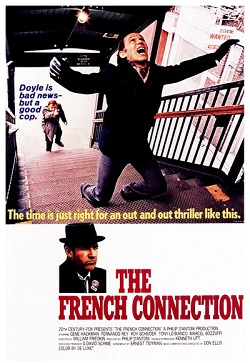
The French Connection is a 1971 American neo-noir action thriller film directed by William Friedkin and starring Gene Hackman, Roy Scheider and Fernando Rey. The screenplay, written by Ernest Tidyman, is based on Robin Moore's 1969 non-fiction book of the same name. It tells the story of fictional NYPD detectives Jimmy "Popeye" Doyle and Buddy "Cloudy" Russo, whose real-life counterparts were narcotics detectives Eddie Egan and Sonny Grosso, in pursuit of wealthy French heroin smuggler Alain Charnier.

William David Friedkin was an American film, television and opera director, producer, and screenwriter who was closely identified with the "New Hollywood" movement of the 1970s. Beginning his career in documentaries in the early 1960s, he is best known for his crime thriller film The French Connection (1971), which won five Academy Awards, including Best Picture and Best Director, and the horror film The Exorcist (1973), which earned him another Academy Award nomination for Best Director.
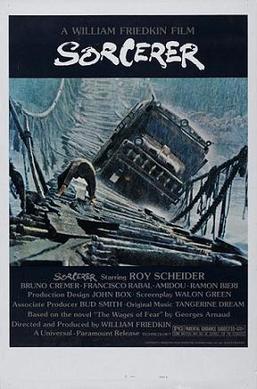
Sorcerer is a 1977 American thriller film directed and produced by William Friedkin and starring Roy Scheider, Bruno Cremer, Francisco Rabal, and Amidou. The second adaptation of Georges Arnaud's 1950 French novel Le Salaire de la peur, it has been widely considered a remake of the 1953 film The Wages of Fear, although Friedkin disagreed with this assessment. The plot depicts four outcasts from varied backgrounds meeting in a South American village, where they are assigned to transport cargoes of aged, poorly kept dynamite that is so unstable that it is 'sweating' its dangerous basic ingredient, nitroglycerin.
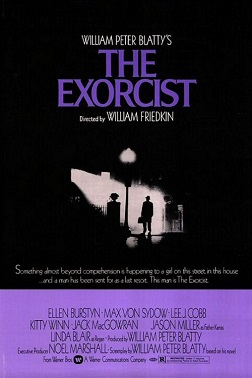
The Exorcist is a 1973 American supernatural horror film directed by William Friedkin from a screenplay by William Peter Blatty, based on his 1971 novel. The film stars Ellen Burstyn, Max von Sydow, Jason Miller, and Linda Blair. The story follows the demonic possession of a young girl and her mother's attempt to rescue her through an exorcism by two Catholic priests.

To Live and Die in L.A. is a 1985 American neo-noir action crime thriller film directed and co-written by William Friedkin and based on the 1984 novel by former United States Secret Service agent Gerald Petievich, who co-wrote the screenplay with Friedkin. The film features William Petersen, Willem Dafoe and John Pankow among others. Wang Chung composed and performed the original music soundtrack. The film tells the story of the lengths to which two Secret Service agents go to arrest a counterfeiter.
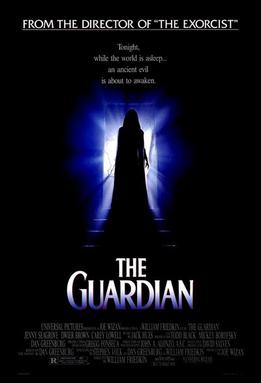
The Guardian is a 1990 American supernatural horror film co-written and directed by William Friedkin, and starring Jenny Seagrove as a mysterious nanny who is hired by new parents, played by Dwier Brown and Carey Lowell, to care for their infant son; the couple soon discover the nanny to be a hamadryad, whose previous clients' children went missing under her care. The film is based on the novel The Nanny, by Dan Greenburg.

Rules of Engagement is a 2000 American war legal drama film, directed by William Friedkin, written by Stephen Gaghan, from a story by Jim Webb, and starring Tommy Lee Jones and Samuel L. Jackson. Jackson plays U.S. Marine Colonel Terry Childers, who is brought to court-martial after Marines under his orders kill several civilians outside the U.S. embassy in Yemen.

Cruising is a 1980 crime thriller film written and directed by William Friedkin and starring Al Pacino, Paul Sorvino, and Karen Allen. It is loosely based on the novel of the same name by The New York Times reporter Gerald Walker about a serial killer targeting gay men, particularly those men associated with the leather scene in the late 1970s. The title is a double entendre, because "cruising" can describe both police officers on patrol and men who are cruising for sex.

Jade is a 1995 American erotic thriller film written by Joe Eszterhas, produced by Robert Evans, directed by William Friedkin, and starring David Caruso, Linda Fiorentino, Chazz Palminteri, Richard Crenna, and Michael Biehn. The original music score was composed by James Horner based on a song composed by Loreena McKennitt. The film was marketed with the tagline "Some fantasies go too far."

The Devil's Brigade is a 1968 American DeLuxe Color war film filmed in Panavision, based on the 1966 book of the same name co-written by American novelist and historian Robert H. Adleman and Col. George Walton, a member of the brigade.

"To Live and Die in L.A." is a single from the soundtrack of the same name by the English new wave band Wang Chung. Released on 25 September 1985, the song peaked on the Billboard Hot 100 at No. 41.
Morton Fine was an American screenwriter.
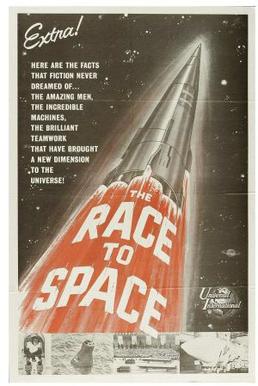
The Race for Space is a 1959 American documentary film directed by David L. Wolper. It was nominated for an Academy Award for Best Documentary Feature. The film was a coproduction between Wolper Productions, the U.S. Department of Defense, and the U.S.S.R. Ministry of Culture.
Pierre Wolper is a Belgian computer scientist at the University of Liège. His research interests include verification methods for reactive and concurrent programs, as well as temporal databases. He is the co-recipient of the 2000 Gödel Prize, along with Moshe Y. Vardi, for his work on temporal logic with finite automata. He also received the 2005 Paris Kanellakis Award for this work.
Unexpected Guest is a 1947 American Western film directed by George Archainbaud and starring William Boyd. The film is a serial Western and part of the Hopalong Cassidy series. It is the 57th entry in a series of 66 films.
The George Pal Memorial Award is presented each year, by the Academy of Science Fiction, Fantasy and Horror Films, in conjunction with their annual Saturn Award ceremony. The award is given to those who have shown exemplary work in the respective film genres. It is named in honor of George Pal, a Hungarian-born American animator and film producer, principally associated with the science fiction genre.
The President's Memorial Award or President's Award is presented by the Academy of Science Fiction, Fantasy and Horror Films, in conjunction with their annual Saturn Award ceremony. The award is given for quality genre entertainment, and is named in honor of Academy founder, Dr. Donald A. Reed.

The People vs. Paul Crump is a 1962 documentary about the prisoner Paul Crump who was on death row for robbery and murder.
The Bold Men is a 1965 documentary film directed by William Friedkin. It was the first of three documentaries Friedkin made for producer David Wolper.
The Thin Blue Line is a 1966 film directed by William Friedkin. It was the second of three documentaries Friedkin made for producer David Wolper. It focuses on the police force, and the experience making it influenced Friedkin on The French Connection.
References
- ↑ Friedkin p 81-85
- Friedkin, William, The Friedkin Connection, HarperCollins 2013